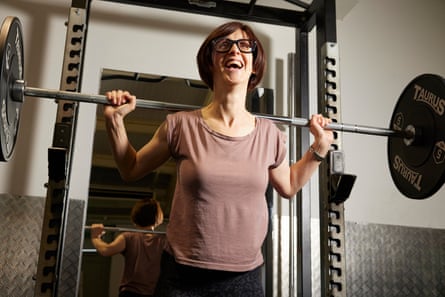I occasionally do self-improvement stuff for work – fell-running, Hula-Hooping, getting up early – and despite sincerely appreciating some of it, and saying I’ll keep it up, I never do. Until a year ago, when I went to a gym to write about lifting heavy weights. This was, to say the least, surprising. I have never enjoyed exercise: I hated it at school, and worked out in my 20s only as an adjunct to an eating disorder. Since then, I’ve mostly walked and done bits of pilates as a dull but necessary investment in my spine. I’ve always been sedentary, a stranger to endorphins.
For some reason, though, I finished writing about lifting heavy weights, shut my laptop and went straight to the gym to lift more. Since then, I have gone three times every week, come rain, shine or Storm Éowyn. Here’s the good, the bad and the ugly from my surprise year of lifting.
It sucks you in …
There’s an internal momentum to weightlifting: progress is quantifiable, incremental and happens when you persevere with no need for natural aptitude. You get better just by showing up, and that’s what keeps me coming. But this is good and bad. We had one of those rare, perfect autumn mornings of golden sun the other day, but I spent much of it in a grey, stale-smelling, artificially lit hangar where they were playing the worst crimes of Capital FM, lifting lumps of metal. I was hoping to get a personal best I could brag about here, but didn’t. This did not feel like the sanest choice.
… but it also demands you stop
There’s a lot to love about an activity in which sitting and scrolling (resting between sets of weights) is essential, and which requires rest and regular days off for success. Exercise that values its opposite so fervently feels special.
The lifting community is low-key inspiring
At my local authority gym, I occasionally chat with (or eavesdrop on) other lifters. It’s astonishing how many are quietly showing up with chronic health conditions and pain, after gruelling double shifts, or bearing heavy caring responsibilities. If they can do it, surely I, with my easy job and functioning body, can too.
You can bear anything for six reps …
A lifelong giver-up, I now tell myself this often, and it’s true. I even apply it to other parts of my life occasionally.

… but failing is fine
Technically speaking, to “lift to failure” (reach the limit of your capability) can be good for building muscle. But emotionally, intellectually, I’ve discovered the gym is also the one place I’m fine with failing. When I mess up, drop a dumbbell or fall over (all regular occurrences), I truly feel it doesn’t matter. I showed up! I tried! I have honestly never felt like this in any other context.
It’s a bit cringey …
“Reps”, “traps”, “delts”, “gains” – all that bro-y weightlifting terminology feels silly in my middle-aged mouth. Even so, it has unlocked a new language for talking, albeit a bit shamefacedly, to my “swole” sons, and I love lifting for that.
And it hasn’t rewired me …
So much weightlifting philosophy feels positive: I read evangelical accounts of how it has transformed women’s attitudes to food, movement and body shape. But there’s plenty of punitive, prescriptive, thunderingly self-absorbed and vapid stuff out there too. People love telling you what you’re doing wrong; why your diet’s bad; why you aren’t getting #gains. I’m not immune to this stuff and I haven’t been magically rewired by picking up a barbell to take simple delight in my body (I wish).
… but it has shown me change is (still) possible
Lifting is famously good for middle-aged women, for our bones, muscles and mood. But it’s been even more powerful, and beneficial, to realise I’m still mutable. I’ve watched my body change gradually (calluses on my palms, extra heft around my shoulders) and acquired skills (I’ve doubled how much I can deadlift; more usefully, I carried a printer the size of a Renault Clio upstairs without disaster yesterday). But even better, lifting has unlocked a sense of possibility. Something that felt fundamental to my personality changed dramatically in months – maybe other things might? That, for me, is the real #gain.
Emma Beddington is a Guardian columnist

 3 months ago
71
3 months ago
71

















































